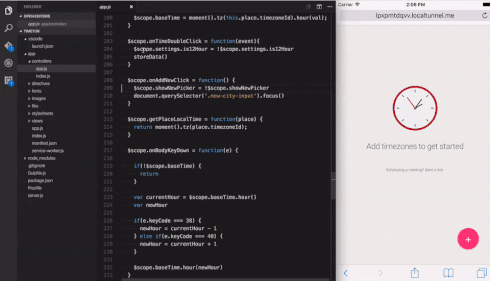
Microsoft is making debugging for iOS devices easily available with its recently announced iOS Web Debugger for Visual Studio Code. The new solution works on Mac and Windows, and is similar to the Chrome debugger the company announced in February. The debugger allows developers to debug JavaScript code from VS code without additional tools.
“As a part of our continuous effort to simplify the daily workflow for developers, we are today enabling mobile web developers to debug JavaScript running on their iOS devices directly from their editor, with our new iOS Web Debugger for Visual Studio Code,” wrote Kenneth Auchenberg, program manager for JavaScript diagnostics at Microsoft, in a blog post.
The debugger supports setting breakpoints, stepping, stack traces, Locals pane, watches, consoles, and debugging eval scripts, and script tags.
In addition, the debugger is designed to find out if developers are gaining value from an integrated iOS debugging solution.
Citrix gives developers a free version of its NetScaler CPX solution
Citrix has announced NetScaler CPX Express, a free version of NetScaler CPX for developers. CPX Express provides the same functionality such as a codebase, REST API and operations interface from the company’s NetScaler platform. It is designed to help developers create microservices applications.
“With the rise of DevOps and microservices, developers increasingly are concerned with reliable application delivery as well as with application development,” said Brad Casemore, research director for data center networks at IDC. “Unfortunately, at the inception of many projects, developers do not always have access to a full-featured ADC. With the introduction of the NetScaler CPX Express, Citrix is responding to that developer need and helping to accelerate the speed at which microservices-based applications can advance from development to deployment.”
The free version features load-balancing capabilities, in-service upgrades, advanced security capabilities, service discovery, auto-reconfiguration, and real-time visibility.
Google’s gRPC framework reaches version 1.0
Google’s Internet-scale RPC framework is ready for deployments. According to the company, gRPC is designed to provide developers with the same scalability, performance and functionality used at Google.
“gRPC can help make connecting, operating and debugging distributed systems as easy as making local function calls; the framework handles all the complexities normally associated with enforcing strict service contracts, data serialization, efficient network communication, authentications and access control, distributed tracing and so on,” wrote Varun Talwar, product manager at Google, in a blog post.
Version 1.0 features multiple language bindings, support for Android and iOS, single-line installation, API stability, and improved performance.
Google plans to release its Daydream VR platform soon
Google is getting deeper into virtual reality. The company recently released Android Nougat with a VR mode, and according to a report from Bloomberg, it is getting ready for the debut of its Daydream VR platform.
According to Bloomberg, Google will promote the platform through apps, shorts and games—specifically Hulu and YouTube.
Google to update mobile search results
Google wants to make the viewing experience on mobile devices easier and simpler. The company announced in the next coming months it will be making changes to its mobile search results in order to make finding content a smoother process.
As part of the updates, Google will be removing the mobile-friendly label to unclutter search results. The label was used to help users find better mobile content, but the company said almost 85% of mobile search pages are mobile-friendly.
In addition, the company will begin to decrease things that make content difficult for users to read such as popups that cover main and standalone interstitials.
Open Container Initiative announces new members
The Open Container Initiative announced that startups are joining its mission to guide the future of container technology. The startups include Anchore, ContainerShip, EasyStack and Replicated.
The Open Container Initiative (OCI) is an open-source project that is aiming to create industry standards around container formats and runtime.
“The rapid growth and interest in container technology over the past few years has led to the emergence of a new ecosystem of startups offering container-based solutions and tools,” said Chris Aniszczyk, the executive director of the OCI. “We are very excited to welcome these new members as we work to develop standards that will aid container portability.”






